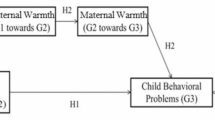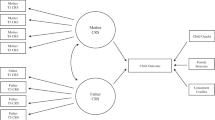Abstract
We examined mother-child (M-C) conflict behavior during the toddler years. The nature of M-C conflict behaviors, whether conflict behavior differed by context, and factors that were associated with conflict interactions were examined. We used data collected as part of the National Evaluation of the Healthy Steps for Young Children Program. 378 M-C dyads participated in this study. Videotaped observational data at 16–18 months were used to code conflict behaviors using an event recording method. Results showed that M-C conflict were more likely to be initiated by the mothers and that conflict interactions were influenced by context of interaction, family, maternal, and child temperamental factors. In this study, we provide a foundation for understanding parent-child conflict interaction prior to age two.
Similar content being viewed by others
References
Bakeman, R., & Gottman, J. M. (1986). Observing interaction: An introduction to sequential analysis. Cambridge: Cambridge University Press.
Bell, R. Q., & Chapman, M. (1986). Child effects in studies using experimental of brief longitudinal approaches to socialization. Developmental Psychology, 22, 595–603.
Braungart-Rieker, J., Garwood, M. M., & Stifter, C. A. (1997). Compliance and noncompliance: The roles of maternal control and child temperament. Journal of Applied Developmental Psychology, 18, 411–428.
Brown, J. R., & Dunn, J. (1996). Continuities in emotional understanding from 3 to 6 years. Child Development, 67, 789–802.
Buss, D. M. (1981). Predicting parent-child interactions from children's activity level. Developmental Psychology, 17, 59–65.
Calkins, S. D. (1994). Origins and outcomes of individual differences in emotion regulation. Monographs of the Society for Research in Child Development. The Development of Emotion Regulation-Biological and Behavioral Considerations, 59, 2/3, 53–72.
Campbell, S. B., Cohn, J. F., & Meyers, T. (1995). Depression in first-time mothers: Mother-infant interaction and depression chronicity. Developmental Psychology, 31, 349–357.
Caughy, M. O., Huang, K., Miller, T. L., & Genevro, J. L. (2004). The effects of the healthy steps for young children program: Results from observations of parenting and child development. Early Childhood Research Quarterly, 19, 611–630.
Caughy, M. O., Miller, T. L., Genevro, J. L., Huang, K., & Nautiyal, C. (2003). The effects of healthy steps on discipline strategies of parents of young children. Applied Developmental Psychology, 24, 517–534.
Chapman, M., & McBride, M. L. (1992). The education of reason: Cognitive conflict and its role in intellectual development. In C. U. Shantz, & W. W. Hartup (Eds.), Conflict in child and adolescent development (pp. 36–69). New York: Cambridge University Press.
Clark, L. A., Kochanska, G., & Eady, R. (2000). Mothers' personality and its interaction with child temperament as predictors of parenting behavior. Journal of Personality and Social Psychology, 79, 274–285.
Coyl, D. D., Roggman, L. A., & Newland, L. A. (2004). Stress, maternal depression, and negative mother-infant interactions in relation to infant attachment. Infant Mental Health Journal, 23, 145–163.
Day, R. D., Peterson, G. W., & McCracken, C. (1998). Predicting spanking of younger and older children by mothers and fathers. Journal of Marriage and the Family, 60, 79–94.
Dishion, T. J., & Patterson, G. R. (1997). The timing and severity of antisocial behavior: Three hypotheses within an ecological framework. In D. M. Stoff, & J. Breiling (Eds.), Handbook of antisocial behavior (pp. 205–217). New York: Wiley.
Dix, T. H. (1991). The affective organization of parenting: Adaptive and maladaptive processes. Psychological Bulletin, 110, 3–25.
Dukewich, T. L., Borkowski, J. G., & Whitman, T. L. (1996). Adolescent mothers and child abuse potential: An evaluation of risk factors. Child Abuse and Neglect, 20, 1031–1047.
Dunn, J. (1993). Social interaction, relationships, and the development of causal discourse and conflict management. European Journal of Psychology of Education, 111, 391–401.
Dunn, J., & Munn, P. (1985). Becoming a family member: Family conflict and the development of social understanding in the second year. Child Development, 56, 480–492.
Dunn, J., & Slomkowski, C. (1992). Conflict and the development of social understanding. In C. Shantz & W. Hartup (Eds.), Conflict in child and adolescent development (pp. 70–92). New York: Cambridge University Press.
Eaton, W., & Ennis, L. (1986). Sex differences in human motor activity level. Psychological Bulletin, 100, 19–28.
Eisenberg, A. R. (1992). Conflicts between mothers and their young children. Merrill-Palmer Quarterly, 38, 21–43.
Eisenberg, N., & Fabes, R. A. (1994). Mothers' reactions to children's negative emotions: Relations to children's temperament and anger behavior. Merrill-Palmer Quarterly, 40, 138–156.
Field, T., Healy, B., Goldstein, S., & Guthertz, M. (1990). Behavior-state matching and synchrony in mother-infant interactions of nondepressed versus depressed dyads. Developmental Psychology, 26, 7–14.
Fox, R. A., Platz, D. L., & Bentley, K. S. (1995). Maternal factors related to parenting practices, developmental expectations, and perceptions of child behavior problems. The Journal of Genetic Psychology, 156, 431–441.
Gardner, F., Fonuga-Barke, E., & Sayal, K. (1999). Parents anticipating misbehavior: An observational study of strategies parents use to prevent conflict with behavior problem children. Journal of Child Psychology and Psychiatry, 40, 1185–1196.
Gershoff, E. T. (2002). Corporal punishment by parents and associated child behaviors and experiences: A meta-analytic and theoretical review. Psychological Bulletin, 128, 539–579.
Giles-Sims, J., Straus, M. A., & Sugarman, D. B. (1995). Child, maternal, and family characteristics associated with spanking. Journal of Applied Family & Child Studies, 44, 170–176.
Goldsmith, H. H. (1996). Studying temperament via construction of the toddler behavior assessment questionnaire. Child Development, 67, 218–235.
Guyer, B., Hughart, N., Strobino, D., Jones, A., & Scharfstein, D. (2000). Assessing the impact of pediatric-based developmental services on infants, families, and clinicians: Challenges to evaluating the healthy steps program. Pediatrics, 105, E33.
Hay, D. F. (1984). Social conflict in early childhood. In G. Whitehurst (Ed.), Annals of child development vol. 1; (pp. 1–44). Greenwich, CT: JAI.
Herrenkohl, R. C., Egolf, B. P., & Herrenkohl, E. C. (1997). Preschool antecedents of adolescent assaultive behavior: A longitudinal study. American Journal of Orthopsychiatry, 67, 422–432.
Herrera, C., & Dunn, J. (1997). Early experiences with family conflict: Implications for arguments with a close friend. Developmental Psychology, 33, 869–881.
Hetherington, E. M., & Kelly, J. (2002). For better or for worse. New York: Norton.
Hoffman, M. L. (1983). Affective and cognitive processes in moral internalization. In E. T. Higgins, D. Ruble, & W. Hartup (Eds.), Social cognition and social development: A sociocultural perspective (pp. 236–274). New York: Cambridge University Press.
Hoffman, Y., & Drotar, D. (1991). The impact of postpartum depressed mood on mother-infant interaction: Like mother like baby? Infant Mental Health Journal, 12, 65–80.
Huang, K., Caughy, M. O., Genevro, J. L., & Miller, I. (2005). Maternal knowledge of child development and quality of parenting among white, African-American and Hispanic mothers. Applied Developmental Psychology, 26, 149–170.
Huston, A. C. (1983). Sex-typing. In P. H. Mussen & E. M. Hetherington (Eds.), Handbook of child psychology: Vol. 4. Socialization, personality, and social development (pp. 388–467). New York: Wiley.
Ingoldsby, E. M., Shaw, D. S., & Garcia, M. M. (2001). Intrafamily conflict in relation to boys' adjustment at school. Development and Psychopathology, 13, 35–52.
Kelley, M. L., Power, T. G., & Wimbush, D. D. (1992). Determinants of disciplinary practices in low-income black mothers. Child Development, 63, 573–582.
Kelley, M. L., Sanchez-Hucles, J., & Walker, R. R. (1993). Correlates of disciplinary practices in working-to-middle-class African-American mothers. Merrill-Palmer Quarterly, 39, 252–264.
Klimes-Dougan, B., & Kopp, C. (1999). Children's conflict tactics with mothers: A longitudinal investigation of the toddler and preschool years. Merrill Palmer Quarterly, 45, 226–242.
Kochanska, G., & Aksan, N. (1995). Mother-child mutually positive affect, the quality of child compliance to requests and prohibitions, and maternal control as correlates of early internalization. Child Development, 66, 236–254.
Kochanska, G., Forman, D. R., & Coy, K. C. (1999). Implications of the mother-child relationship in infancy socialization in the second year of life. Infant Behavior & Development, 22, 249–265.
Kuczynski, L., Kochanska, G., Radke-Yarrow, M., & Girnius-Brown, O. (1987). A developmental interpretation of young children's noncompliance. Developmental Psychology, 23, 799–806.
Laible, D. J., & Thompson, R. A. (2002). Mother-child conflict in the toddler years: Lessons in emotion, morality, and relationships. Child Development, 73, 1187–1203.
Lamb, M., Ketterlinus, R., & Fracasso, M. (1992). Parent-child relationships. In M. Borenstein, & M. Lamb (Eds.), Developmental psychology: An advanced textbook (3 ed.). Hillsdale, NJ: Lawrence Erlbaum Associates.
Larzelere, R. E. (2000). Child outcomes of nonabusive and customary physical punishment by parents: An updated literature review. Clinical Child and Family Psychology Review, 3, 199–221.
Lecuyer-Maus, E. A., & Houck, G. M. (2002). Mother-toddler interaction and the development of self-regulation in a limit-setting context. Journal of Pediatric Nurse, 17, 184–200.
Lytton, H., & Romney, D. M. (1991). Parents' differential socialization of boys and girls: A meta-analysis. Psychological Bulletin, 109, 267–296.
MacPhee, D. (1981). Knowledge of infant development inventory manual. Chapel Hill, NC: Department of Psychology, University of North Carolina.
McLoyd, V. C. (1990). The impact of econmic hardship on black families and children: Psychological distress, parenting, and socioemotional development. Child Development, 61, 311–346.
Minkovitz, C. S., Hughart, N., Strobino, D., Scharfstein, D., Grason, H., & Hou, W. (2003). A practice-based intervention to enhance quality of care in the first 3 years of life: The healthy steps for young children program. Journal of the American Medical Association, 290, 3081–3091.
Minton, C., Kagan, J., & Levine, J. A. (1971). Maternal control and obedience in the two-year-old. Child Development, 42, 1873–1894.
Power, T. G., & Chapieski, M. L. (1986). Childrearing and impulse control in toddlers: A naturalistic investigation. Developmental Psychology, 22, 271–275.
Power, T. G., Olvera, N., & Hays, J. (2002). Maternal socialization of safety practices among Mexican American children. Applied Developmental Psychology, 23, 83–97.
Rubin, K. H., Hastings, P., Chen, X., Stewart, S., & McNichol, K. (1998). Interpersonal and maternal correlates of aggression, conflict, and externalizing problems in toddlers. Child Development, 69, 1614–1629.
Smith, T. K. (2002). The relationship between knowledge, attributions and behavior in adolescent mothers: Implications for child outcomes. Unpublished manuscript.
Strassberg, Z., Dodge, K. A., Pettit, G. S., & Bates, J. E. (1994). Spanking in the home and children's subsequent aggression toward kindergarten peers. Development and Psychopathology, 6, 445–461.
Sumner, G., & Spietz, A. (1994). NCAST: Caregiver/parent-child interaction teaching manual. Seattle, Washington: NCAST Publications.
Thompson, R. A. (1994). Emotion regulation: A theme in search of definition. The development of emotion regulation- biological and behavioral considerations. Monographs of the society for research in child development, Vol. 59 (2–3, serial no. 240), pp. (25–52).
Tronick, E. Z., & Cohn, J. F. (1989). Infant-mother face-to-fact interaction: Age and gender differences in coordination. Child Development, 60, 85–92.
Valsiner, J., & Cairns, R. B. (1992). Theoretical perspectives on conflict and development. In C. U. Shantz, & W. W. Hartup (Eds.), Conflict in child and adolescent development (pp. 15–35). New York: Cambridge University Press.
Vaughn, B., Stevenson-Hinde, J. M., & Waters, E. (1992). Attachment security and temperament in infancy and early childhood: Some conceptual clarifications. Developmental Psychology, 28, 463–473.
Acknowledgments
This research is based on data collected from the Healthy Steps for Young Children Program; data collection was funded by the William T. Grant Foundation, The Amarillo Area Foundation, The Duke Endowment, The Hogg Foundation and The McLeod Foundation. Partial results from the study were presented at the 2005 Society for Research in Child Development Biennial Meeting in Atlanta, GA. The advice of Dr. Tess Miller and Dr. Raymond Starr, and support from Dr. Cynthia Minkovitz, Dr. Bernard Guyer, Dr. Donna Strobino, Ms. Nancy Hughart, and Theresa Schmitz are gratefully acknowledged.
Author information
Authors and Affiliations
Corresponding author
Rights and permissions
About this article
Cite this article
Huang, KY., Teti, D.M., Caughy, M.O. et al. Mother-Child Conflict Interaction in the Toddler Years: Behavior Patterns and Correlates. J Child Fam Stud 16, 219–241 (2007). https://doi.org/10.1007/s10826-006-9081-6
Published:
Issue Date:
DOI: https://doi.org/10.1007/s10826-006-9081-6




